On November 19 the message considered section A.
On November 20 the message considers sections B - E.
On November 21 the message will consider Mary's role in the Christian life.
On November 22 we will conclude with much of the information given on the
Christian life.
November 22 can be studied for a more comprehensive study.
I. Introduction
II. Concept of the Christian life
Shepherds of Christ
A Spirituality Newsletter for Priests
and Others Interested in the Spiritual Life
2000 - ISSUE THREE
An Overview of the Spiritual Life
I am the good shepherd: the good shepherd lays down his life for his sheep.
The hired man, since he is not the shepherd and the sheep do not belong to him, abandons
the sheep as soon as he sees a wolf coming, and runs away, and then the wolf attacks and
scatters the sheep; he runs away because he is only a hired man and has no concern for the
sheep. I am the good shepherd; I know my own and my own know me, just as the Father knows
me and I know the Father; and I lay down my life for my sheep. (Jn 10:11-151)
The Good Shepherd gave His life so that we may have life
and have it in abundance. In this issue we offer an overview of the life Jesus came to
give. We begin by presenting a brief sketch of the spiritual life. This will be followed
by content which speaks in a more detailed manner about the various dimensions of the
spiritual life -- our life in Christ.
A Sketch of the Spiritual Life
The Christian life is rooted in the great event of the
Incarnation. We must consequently always focus our gaze upon Christ, realizing that the
Father has spoken to us in the life, death, resurrection, and ascension of Jesus. It only
remains for us, then, to strive to understand with greater insight the inexhaustible truth
of the Word Incarnate (Heb 1:1-2).
What was the condition of the human race at the time of
Christ’s coming? In some ways, people were much the same as we are today. There were
those just being born into this world of human drama. There were those who, in death, were
leaving it, some of whom had grasped but little of life’s meaning. There were those
who were healthy and vigorous. There were those who were sick and lame. Some especially
felt the burdens, the grief, the suffering of the human condition. Others were ebullient
and desired all the pleasures life could provide. There was some good being accomplished.
Immorality, however, was rampant. What St. Paul tells us concerning the time that
immediately followed Christ’s existence certainly could also be applied to the time
of His entrance into the world. It is, in short, an ugly picture that St. Paul depicts for
us (Rom 1:22-32).
Into such a depraved condition Jesus entered, with a
full and generous Heart, to lead the human race from the depths of sinfulness to the
vibrant richness of a new life in Himself. Through His enfleshment, this Christ became the
focal point of all history. The authentic hopes and dreams of the human family, now so
overshadowed by the ugliness of sin, came converging upon this Christ. He would gather
them up in Himself, give them a new luster and brilliance and dynamism, and would lead the
human family back to the Father in the Holy Spirit.
Christ was radically to release us from the dominion of
sin and elevate us to a new level of existence. This life Christ has given us is not a
type of superstructure which is erected atop human existence. Although nature and grace
are distinct, they do not lie side by side as separate entities. Rather, grace permeates
nature. The Christian is one graced person. The Christian is one who has been raised up,
caught up, into a deeper form of life in Christ Jesus. Nothing that is authentically human
in the life of the Christian has been excluded from this new existence. Whatever is really
human in the life of the Christian is meant to be an expression of the Christ-life. The
simple but deep joys of family life, the wonderment at nature’s beauty, the warm
embrace of a mother for her child, the agony of crucial decision making, the success or
frustration that is experienced in one’s work, the joy of being well received by
others, and the heartache of being misunderstood—all these experiences are intended
to be caught up in Christ and made more deeply human because of Him.
Jesus has come, then, not to destroy anything that is
authentically human, but to perfect it by leading it to a graced fulfillment. The more
God-like we become through Christ, the more human we become.
We, through our incorporation into Christ which occurs
at Baptism, are meant to relive the life, death, and resurrection of Jesus. In doing so,
we are not only accomplishing our own salvation, but we are assisting in the salvation of
others also. The Incarnation continues all the time. Christ, or course, is the one Who
fundamentally continues the Incarnation. But He enlists our help. The world no longer sees
Jesus, no longer is able to reach out and touch Him. We are the ones who now, in some way,
make Christ visible and tangible. In union with the invisible, glorified Christ, and
depending on Him as our source of life, we continue the Incarnation in its visible and
temporal dimensions. This is our great privilege. This is our great responsibility.
The Christian is initiated into the mystery of Christ,
into his or her role in prolonging the Incarnation, through Baptism (Rom 6:3-4).
It is not sufficient, however, that we be incorporated
into Christ through Baptism. All forms of life require nourishment. So, too, our life in
Christ must be continually nourished. How can we continually keep in contact with Christ?
There are various ways as we live our life within the Church. We contact Christ in a most
special way through the liturgy, above all in the Eucharistic liturgy. Through our most
special and most personal meeting with Jesus in the Mass, we are more deeply incorporated
into Christ. Also, we should remember that all the sacraments make up part of the
Church’s liturgy.
The reading of Scripture provides another special
opportunity for meeting Jesus. This is true for both Old and New Testaments. The Old
Testament prefigures the New Testament and leads to it. It is obvious, however, that we
meet Christ especially in the pages of the New Testament. How true it is to say that not
to be familiar with Scripture is not to know Jesus properly. We should resolve to read
from Scripture daily.
We also meet Jesus in our interaction with others.
Everyone we meet, everyone we serve, is in the image of Jesus. We have to take the means
to grow in this awareness. If I truly believe that everyone has been redeemed by the blood
of Jesus, how should I treat everyone?
These, then, are some of the ways we keep in contact
with Jesus. Common to the various ways of meeting Jesus is a certain degree of prayerful
reflection. Our contact with Jesus in the liturgy, in Scripture, and in our interaction
with others, and so forth, will not be all that it should be unless we are persons of
prayer. The light and strength of prayer enables us to keep in contact with Jesus as we
should.
We live out our Christ-life in an atmosphere of love.
Indeed, the life Jesus has given us is centered in love. It has its origins in the
mysterious love of God (Jn 3:16).
Our new life in Jesus has arisen out of God’s
fathomless love. Christ, in His descent into human flesh, has established a milieu of
love. The life He came to give can flourish only in the framework of love. Indeed, we can
summarize the meaning of the Christian life by stating that it is our loving response to
God’s love. The pierced Heart of Jesus, this Heart which shed its last drop of blood
in the greatest love for each one of us, is the symbol of God’s tremendous love for
us. Christ’s Heart also calls us to respond by giving ourselves in love to God and
neighbor. Yes, Jesus invites us to respond to God’s love by giving ourselves in love
to Him in an ever closer union. The more closely we are united to Him, the greater is our
capacity to love God and neighbor. The more closely we are united with Jesus, the more
closely He unites us to the Father in the Holy Spirit, with Mary our Mother at our side.
The Indwelling of the Trinity and the Life of
Grace
The spiritual life, the life of holiness, begins at
Baptism. Archbishop Luis Martinez says:
"When we are born we are endowed by God with all we
need for our human life, a complete organism, and a soul with the full range of faculties.
Of course they are not all developed from birth, but we have them then as the source of
everything we are going to need in life. And thus it is also in the spiritual order. When
someone is baptized, he receives in all its fullness that supernatural world which the
Christian carries within his soul. He receives grace, which is a participation of the
nature of God; the theological virtues, which put him in immediate contact with the
divine; the moral virtues, which serve to regulate and order all his life; and the gifts
of the Holy Spirit, the divine, mysterious receivers for picking up the Spirit’s
inspirations and movements."2
Another author states: "The Three Divine Persons
inhabit the sanctuary of our soul, taking their delight in enriching it with supernatural
gifts and in communicating to us a Godlike life, similar to theirs, called the life of
grace.
"All life, however, implies a threefold element: a vital
principle that is, so to speak, the source of life itself; faculties which give
the power to elicit vital acts; and lastly, the acts themselves which are but its
development and which minister to its growth. In the supernatural order, God living within
us produces the same elements. He first communicates to us habitual grace (the life
of sanctifying grace) which plays the part of a vital supernatural principle. This
principle deifies, as it were, the very substance of the soul and makes it capable, though
in a remote way, of enjoying the Beatific Vision and of performing the acts that lead to
it.
"Out of this grace spring the infused virtues and
the gifts of the Holy Spirit which perfect our faculties and endow us with the
immediate power of performing Godlike, supernatural, meritorious acts.
"In order to stir these faculties into action, He
give us actual graces which enlighten our mind, strengthen our will, and aid us both to
act supernaturally and to increase the measure of habitual grace that has been granted to
us.
"Although this life of grace is entirely distinct
from our natural life it is not merely superimposed on the latter. It penetrates it
through and through, transforms it and makes it divine. It assimilates whatever is
good in our nature, our education and our habits. It perfects and supernaturalizes all
these various elements, directing them toward the last end, that is toward the possession
of God through the Beatific Vision and its resultant life." 3
Our being in the state of sanctifying of grace and the
special indwelling of the Persons of the Trinity within us always exist together. We
cannot have the one without the other. Our life of grace, which is a sharing in
Trinitarian life, allows us to know and love Father, Son, and Holy Spirit in a most
intimate fashion. Through grace we are in the image of the Trinity, and we enjoy special
relationships with the Divine Persons.
Again, we listen to the words of Archbishop Martinez as
he speaks about our relationships with the Divine Persons:
"Love, we have said, is the foundation of devotion
to the Holy Spirit, as it is also the foundation of Christian perfection. But love as a
reflection of God, as His own image, is something that encloses within its simplicity a
boundless wealth and a variety of forms. Who can fathom the depths of love?
"Human love in all its manifestations is admirably
in harmony with the love of charity; it is confident in filial love, trusting in
friendship, sweet and fruitful in the love of husband and wife, disinterested and tender
in the love of a mother. Our love of God must include all these forms of human love; every
fiber of our heart must vibrate when the harmonious and full canticle of love bursts forth
from it. But since God is one in essence and triune in Persons, our love for Him takes on
a particular aspect accordingly as it is directed to each one of the divine Persons.
"Our love for the Father is tender and confident
like that of children; eager to glorify Him as His only-begotten Son taught us to do by
word and example. Love for the Father is the intense desire to have His will fulfilled on
earth as it is in heaven. Our love for the Son, who willed to become flesh for us, is
characterized by the tendency to union with Him and transformation into Him; by imitation
of His example, participation in His life, and the sharing of His sufferings and His
Cross. The Eucharist, mystery of love, of sorrow, and of union, reveals the
characteristics of this love.
"Love for the Holy Spirit also has its special
character, which we should study in order completely to understand devotion to Him. We
have explained how the Holy Spirit loves us, how He moves us like a divine breath that
draws us to the bosom of God, like a sacred fire that transforms us into fire, like a
divine artist who forms Jesus in us. Surely, then, our love for the Holy Spirit should be
marked by loving docility, by full surrender, and by a constant fidelity that permits us
to be moved, directed, and transformed by His sanctifying action.
"Our love for the Father tends to glorify
Him; our love for the Son, to transform ourselves into Him; our love for the Holy
Spirit, to let ourselves be possessed and moved by Him."4
Life In and With Jesus
The spiritual life centers in Christ. Here are words
from the Jerusalem Catecheses: "When we were baptized into Christ and clothed
ourselves in him, we were transformed into the likeness of the Son of God. Having destined
us to be his adopted sons, God gave us a likeness to Christ in his glory, and living as we
do in communion with Christ, God’s anointed, we ourselves are rightly called
‘the anointed ones.’ " 5
Msgr. Robert Guste says: "Ideal Catholics held up
to us by the Church are the saints. As you read their lives, what do you notice? One after
the other, they were men and women who had a deep, personal relationship with Our Lord
Jesus Christ. Their hearts were on fire with love for Him..." 6
When we are baptized we are incorporated into
Christ’s paschal mystery of death and resurrection. St. Paul speaks of this marvelous
union with Jesus: You cannot have forgotten that all of us, when we were baptised into
Christ Jesus, were baptised into his death. So by our baptism into his death we were
buried with him, so that as Christ was raised from the dead by the Father’s glorious
power, we too should begin living a new life. (Rm 6:3-4).
Christ has structured the Christian life by the way He
lived, died, and rose from the dead. It is obvious, then, as Paul tells us above, that the
pattern of death-resurrection must be at the heart of the Church’s life. Individually
and collectively, we continually die with Christ so that we may continually rise with Him.
Thus we pass over in a process of ongoing religious transition to a greater participation
in Christ’s resurrection. It is true that our participation in Christ’s
resurrection will reach its completion only in eternity. Nevertheless, we begin the life
of resurrection here upon the earth, in the here and now of human life, in the midst of
joy and pain; in the experience of success and failure, in the sweat of our brow, in the
enjoyment of God’s gifts. As Christians, we should have a sense of dynamic growth
concerning our here and now life of resurrection.
We cannot maintain the life of resurrection or grow in
it without a willingness to suffer. This does not mean that we need to feel overwhelmed
and heavily burdened in our lives. The greater portion of suffering for most Christians
seems to be an accumulation of ordinary hardships, difficulties, and pains. At times,
however, deep suffering, even suffering of agonizing proportions, can enter into
one’s life. Whether the sufferings one encounters are of either the more ordinary
variety or the more rare and extreme type, Christians must convince themselves that to
relate properly to the cross is to grow in resurrection, and growth in resurrection means
we will also have an increased capacity to help give resurrection to others.
- The Church invites us to share deeply in the passion of Christ, in the
cross of Christ. She does so that we might share deeply in His life of
resurrection—here and hereafter. The more we die with Christ, the more we share in
His life of resurrection—here and hereafter. Our ultimate goal here below is not the
cross, but resurrection—the newness of life the cross leads to - here below as well
as in eternity.
We are meant to share in all of the mysteries of Christ here
below—we are meant to relive them in our own lives. And all of these mysteries are
directed to the crowning mystery of Jesus, His resurrection: "As the Church is ever
re-enacting, during all the ages, the life story of her Divine Spouse—undergoing in
the Mystical Body what He suffered in His Natural Body, so it must be too, in some
measure, for every individual Christian that lives in real unity with Christ. It was thus
that the saints understood the life of the Divine Master. They not merely contemplated
it, they lived it. This was the source of the immense sympathy they were capable of
experiencing for Him in His different states. They felt in a certain measure what He felt,
and what is true of Our Lord’s life considered as a whole must be true in no
imperfect or limited manner of that which was the supreme and crowning mystery in that
life—namely, the Resurrection. This must be, not merely a fact in Christian
history, but a phase of Christian experience …We do not readily perceive that, in
God’s plan, not only the Cross, but the Risen Life that followed it, is meant to be
part of our terrestrial existence. Christ did not pass from the Cross straight to heaven.
The Christian is not meant to do so either. In the case of Jesus the Cross preceded,
prepared and prefaced a risen life on earth. In the case of the Christian the Cross is
meant to play a somewhat similar role—that is, to be the prelude to a risen life,
even here below.
"The Cross cannot be completely understood except
it is viewed in the full light of the Resurrection. It is the latter, not the former, that
is the ultimate mystery for us…The Cross is a means, not an end; it finds its
explanation only in the empty tomb; it is an entrance into life, not a mode of death. Any
death that enters into God’s plan must necessarily issue forth in life. If He lays
upon us the necessity of dying it is in order that we may live…In order that we may
live as we ought, our rebellious nature must be crucified. Crucifixion always remains the
only mode of salvation.
"God sends trials and crosses simply to deaden in
us the activity of the forces that make for the decay of the spiritual life, in order that
that spiritual life may develop and expand unimpeded. According as the life of perverse
nature ebbs away from us on our cross united with Christ’s, the Divine Life that God
has placed in all whom He has called begins to make itself more manifest and to display
increased vigour and vitality…It is to that Resurrection, that life in death, that
God directs all the circumstances of our life—it is the object He aims at in His
dealing with us." 7
In his above words, Fr. Edward Leen, C.S.Sp., speaks
about a special episode of our participation in the resurrection of Jesus. He speaks of
our Christ-life, our life of grace, in the highly developed state. We should all strive
for this state. We must realize, however, that all those who live in the state of grace
are, in an essential way, living the life of resurrection. They are alive in Christ Jesus.
"I ask you to consider that our Lord Jesus Christ
is your true head and that you are a member of his body. He belongs to you as the head
belongs to the body. All that is his is yours: breath, heart, body, soul and all his
faculties. All of these you must use as if they belonged to you, so that in serving him
you may give him praise, love and glory. You belong to him as a member belongs to the
head. This is why he earnestly desires you to serve and glorify the Father by using all
your faculties as if they were his.
"He belongs to you, but more than that, he longs to
be in you, living and ruling in you, as the head lives and rules in the body. He desires
that whatever is in him may live and rule in you: his breath in your breath, his heart in
your heart, all the faculties of his soul in the faculties of your soul...
"You belong to the Son of God, but more than that,
you ought to be in him as the members are in the head. All that is in you must be
incorporated into him. You must receive life from him and be ruled by him. There will be
no true life for you except in him, for he is the one source of true life. Apart from him
you will find only death and destruction. Let him be the only source of your movements, of
the actions and the strength of your life.
"Finally, you are one with Jesus as the body is one
with the head. You must, then, have one breath with him, one soul, one life, one will, one
mind, one heart. And he must be your breath, heart, love, life, your all. These great
gifts in the follower of Christ originate from baptism. They are increased and
strengthened through confirmation and by making good use of other graces that are given by
God. Through the holy eucharist they are brought to perfection." 8
St. Ignatius of Antioch was deeply consumed with love
for Jesus: "At last I am well on the way to being a disciple. May nothing, seen or
unseen, fascinate me, so that I may happily make my way to Jesus Christ! Fire, cross,
struggles with wild beasts, wrenching of bones, mangling of limbs, crunching of the whole
body, cruel tortures inflicted by the devil—let them come upon me, provided only I
make my way to Jesus Christ."9
Cardinal Newman tells us: "Everyone who breathes,
high and low, educated and ignorant, young and old, man and woman, has a mission, has a
work. We are not born at random... God sees every one of us; He creates every soul, He
lodges it in a body, one by one, for a purpose. He needs, He deigns to need, every one of
us."10
Because of the uniqueness of each Christian's existence,
he or she presents Christ with a unique opportunity. Each Christian has the vocation to
offer Christ his or her humanity so that Jesus can live in that individual in a special
way. This Jesus is Priest, Prophet and King. To the extent that an individual Christian
offers his or her humanity to Jesus, that person has an unique opportunity to help to
continue the work of the redemption--an opportunity that no one else can fulfill.
Likewise, to the extent that an individual fails to offer his or her humanity to Christ,
Jesus loses the opportunity to continue His redemptive work according to that person's
uniqueness.
Concerning the prophetic or teaching office of Christ,
each of us has the ever-present opportunity of witnessing to the truth of Christ by the
way we live. Mother Teresa gives a striking example of this. She says: "I received a
letter from a wealthy Brazilian man. He assured me that he had lost his faith -- not just
his faith in God but his faith in humanity as well. He was fed up with his situation and
everything around him. He only thought about suicide.
"One day, walking on a busy street downtown, he saw
a television set in a store window. The program was about our Home for the Dying in
Calcutta, and it showed our Sisters taking care of the sick and the dying.
"The man confessed that when he saw that, he felt
the urge to kneel and pray, after many years of not ever kneeling or praying.
"From that day on, he recovered his faith in God
and in humanity, and he was convinced that God still loves him."11
St. Paul, one who loved Jesus so deeply, has left us
these words: "But we hold this treasure in pots of earthenware, so that the
immensity of the power is God’s and not our own. We are subjected to every kind of
hardship, but never distressed; we see no way out but we never despair; we are pursued but
never cut off; knocked down, but still have some life in us; always we carry with us in
our body the death of Jesus so that the life of Jesus, too, may be visible in our body.
Indeed, while we are still alive, we are continually being handed over to death, for the
sake of Jesus, so that the life of Jesus, too, may be visible in our mortal flesh."
(2 Cor 4:7-11).
You share my burdens,
You take them upon yourself.
You listen to me fondly when I tell you my troubles.
You never fail to lighten them.
I find You at all times and in all places.
You never leave me.
I will always find You wherever I go.
Old age or misfortune will not cause You to abandon me.
You will never be closer to me than
When all seems to go against me.
No matter how miserable I may be,
You will never cease to be my friend.
You tolerate my faults with admirable patience.
You are always ready to come to me, if I so desire it.
Jesus, may I die praising you!
May I die loving you!
May I die for the love of you.12
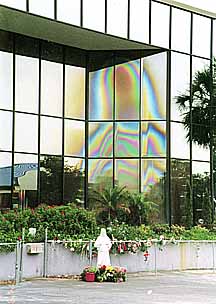
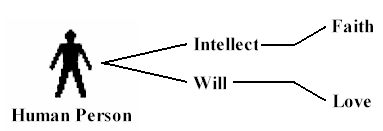
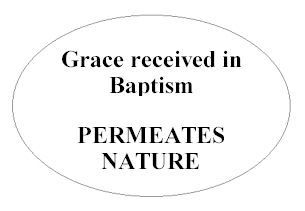
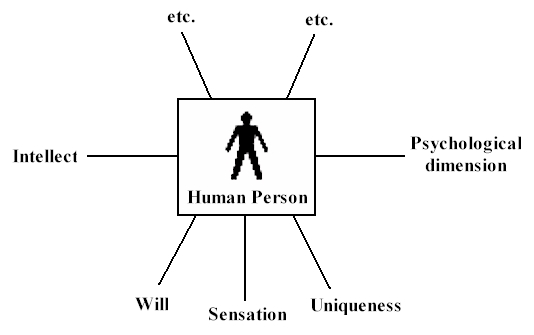

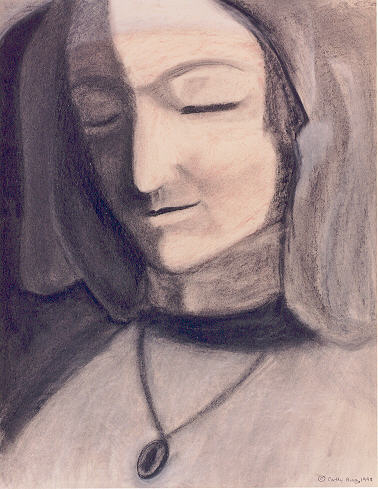 Mary's
Message from the Rosary of August 27, 1996
Mary's
Message from the Rosary of August 27, 1996

